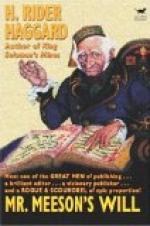The captain had told the extraordinary tale to the port officials when they boarded the vessel, and on getting ashore the port officials had made haste to tell every living soul they met the wonderful news that two survivors of the ill-fated Kangaroo—the history of whose tragic end had sent a thrill of horror through the English-speaking world—were safe and sound on board the West India boat. Thus, by the time that Augusta, Mrs. Thomas, and Dick were safe on shore, their story, or rather sundry distorted versions of it, was flashing up the wires to the various press agencies, and running through Southampton like wild-fire. Scarcely were their feet set upon the quay, when, with a rush and a bound, wild men, with note-books in their hands, sprang upon them, and beat them down with a rain of questions. Augusta found it impossible to answer them all at once, so contented herself with saying, “Yes,” “Yes,” “Yes,” to everything, out of which mono-syllable, she afterwards found to her surprise, these fierce and active pressmen contrived to make up a sufficiently moving tale; which included glowing accounts of the horrors of the shipwreck, and, what rather took her aback, a positive statement that she and the sailors had lived for a fortnight upon the broiled remains of Mr. Meeson. One interviewer, being a small man, and, therefore, unable to kick and fight his way through the ring which surrounded Augusta and Mrs. Thomas, seized upon little Dick, and commenced to chirp and snap his fingers at him in the intervals of asking him such questions as he thought suitable to his years.
Dick, dreadfully alarmed, fled with a howl; but this did not prevent a column and a half of matter, headed “The Infant’s Tale of Woe,” from appearing that very day in a journal noted for the accuracy and unsensational character of its communications. Nor was the army of interviewers the only terror that they had to face. Little girls gave them bouquets; an old lady, whose brain was permeated with the idea that shipwrecked people went about in a condition of undress for much longer than was necessary after the event, arrived with an armful of under-clothing streaming on the breeze; and last, but not least, a tall gentleman, with a beautiful moustache, thrust into Augusta’s hand a note hastily written in pencil, which, when opened, proved to be an offer of marriage!
However, at last they found themselves in a first-class carriage, ready to start, or rather starting. The interviewing gentlemen, two of whom had their heads jammed through the window, were forcibly drawn away—still asking questions, by the officials—the tall gentleman with the moustache, who was hovering in the background, smiled a soft farewell, in which modesty struggled visibly with hope, the station-master took off his cap, and in another minute they were rolling out of Southampton Station.




